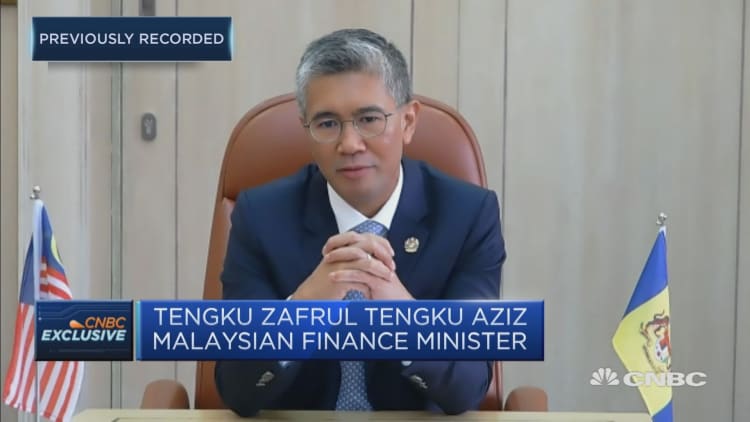
SINGAPORE — Malaysia's debt levels are set to go up, says its finance minister, as the country embarks on measures to support businesses and citizens to deal with the economic fallout from the conoravirus.
"We're anticipating and forecasting that deficit will go up this year for Malaysia," Tengku Zafrul Aziz told CNBC, adding that fiscal deficit will come in at around 5.8% to 6%. So far, fiscal injections into the economy stand at around 20% of its GDP, according to Zafrul.
"We are still focused on fiscal responsibility, of course. We have debt-to-GDP now at around 53%, it will end at around 56%. We have approval from parliament to go up to 60%," he said Monday during an interview on CNBC's "Asia Squawk Box."
In August, Malaysia's parliament voted to allow the government to borrow up to 60% of its GDP as part of temporary measures to ease the blow of the pandemic on businesses.
Malaysia has rolled out about 305 billion Malaysian ringgit ($73.3 billion) in stimulus packages so far this year, to help inject cash into the economy and prop it up.
Even before the pandemic broke out, Moody's warned about Malaysia's debt.
Moody's Investors Service said in January the Southeast Asian country's debt burden was "significantly higher" than other countries with an "A" sovereign credit rating. A sovereign credit rating is an assessment of a country's creditworthiness, and an "A" rating means low credit risk.
"However, deep domestic capital markets and high savings provide a stable funding pool for the government's debt, and partly offset these fiscal weaknesses," Moody's said at that time.
The bright spot, according to Zafrul, is that the government is "optimistic" that the economy next year will expand by around 5.5% to 8%, from negative growth this year. For 2020, GDP is expected to be around -5.5% to -3.5%.


